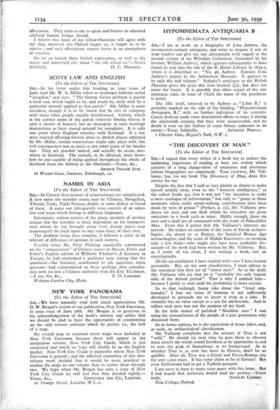NAMES IN ASIA
[To the Editor of THE SPECTATOR]
Sul,—In Central Asia matters of nomenclature are complicated. A new name the traveller meets may be Chinese, Mongolian, Tibetan, Turki, Tajiki Persian, Arabic or some dialect or blend of these. A name not infrequently even consists of an adjec- tive and noun which belong to different languages.
Informants, seldom natives of the place, speakers of another tongue (for the traveller is often dependent on his transport- men whom he has brought along from distant parts) may transmogrify the local name to suit some fancy of their own.
The problem being thus complex, it behoves a critic to be tolerant of difference of opinion in such matters.
Possibly when Mr. Peter Fleming caustically commented on the " romanisation " of Chinese names in Messrs. Faber and Faber's English edition of Wilhelm Ella-flier's A Scientist in Tartary, he had overlooked a prefatory note stating that the translator—like Socrates, unashamed to ask questions when ignorant—had compromised on these spellings after consulta- tion with no less a Chinese authority than Sir Eric Teichman.
am, Sir, &c., E. 0. LOIUMER. Welwyn Garden City, Hens.










































 Previous page
Previous page